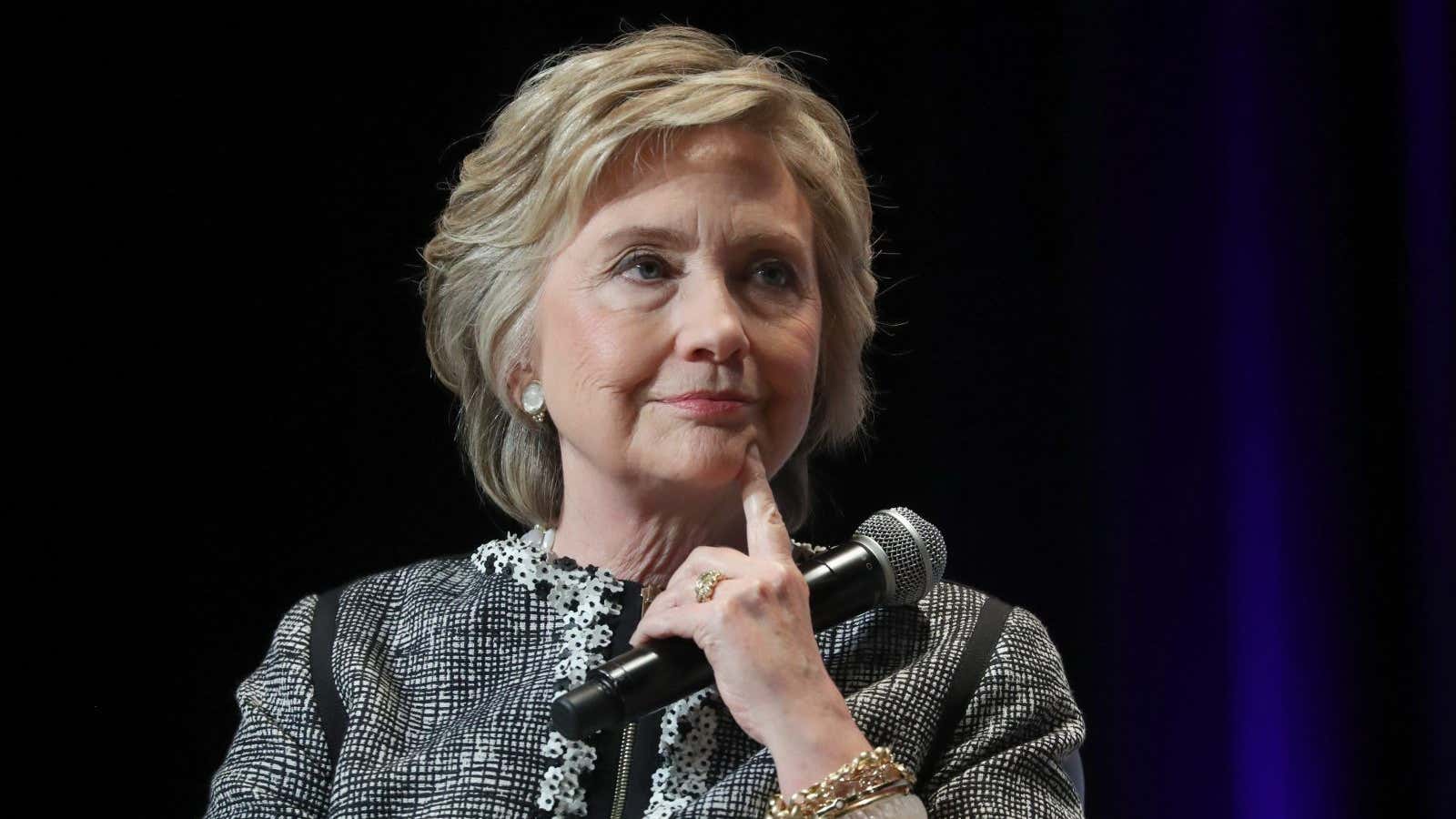Former US presidential candidate Hillary Clinton said Kenya’s annulled election was “a project” of Cambridge Analytica, a data company at the center of a growing controversy over the use of personal data to influence both the Brexit vote in the UK and the Donald Trump election in the US.
Speaking to US public radio host Terry Gross on NPR’s Fresh Air program about the 2016 American presidential election, Clinton said she was also probing what happened with Kenya’s election, and why the supreme court decided to call the election “invalid.” The former US secretary of state has been making a round of media interviews promoting her book “What Happened,” in which she recounts her 2016 election experiences. Clinton, who won the popular vote but lost the electoral vote count, also said she would not rule out questioning the credibility of the US results if new information showed that the Russian-led cyber intrusions were deeper than currently known.
Cambridge Analytica mines both online data and individual psychometric profiles in order to personalize political messaging and communicate with both supporters and undecided voters. The company is partly owned by the Mercer family and most closely linked to Robert Mercer, a hedge fund billionaire who supports conservative causes and candidates.
Steve Bannon, the ex-White House chief strategist and the editor of the right-wing website Breitbart, has also reportedly served as a corporate officer at Cambridge Analytica. The Mercer family have also been found to be part owners of Breitbart news site, but reportedly have no editorial role.
In a majority decision on Sept. 1, Kenya’s supreme court called the Aug. 8 re-election of president Uhuru Kenyatta “invalid, null and void,” and ordered the electoral commission to hold a new vote in 60 days. The decision was reached after opposition candidate Raila Odinga challenged the results in court, citing the hacking of the voting system and the making of a “computer generated leadership.” Election observers who endorsed the election, including Clinton’s successor at the US State Department John Kerry, were also criticized for moving “fast to sanitize fraud.”
And much like the US election, attempts at propaganda and the dissemination of fake news were also evident in Kenya’s 2017 election. Social media networks, and especially Facebook and WhatsApp, were used as conduits to spread misinformation and sway public opinion. Clinton has also been very critical of Facebook’s role in the US.
President Kenyatta’s Jubilee Party reportedly hired Cambridge Analytica in a bid to win a second term, and the company was accused of being behind the anti-Odinga attack ads that appeared online.
But unlike the Kenyan constitution which allowed the courts to overturn results, Clinton decried that the US didn’t have a mechanism like that yet.
Gross: I want to get back to the question, would you completely rule out questioning the legitimacy of this election if we learn that the Russian interference in the election is even deeper than we know now?
Clinton: No. I would not. I would say —
Gross: You’re not going to rule it out.
Clinton: No, I wouldn’t rule it out.
Gross: So what are the means, like, this is totally unprecedented in every way —
Clinton: It is.
Gross: What would be the means to challenge it, if you thought it should be challenged?
Clinton: Basically I don’t believe there are. There are scholars, academics, who have arguments that it would be, but I don’t think they’re on strong ground. But people are making those arguments. I just don’t think we have a mechanism. You know, the Kenya election was just overturned and really what’s interesting about that—and I hope somebody writes about it, Terry—the Kenyan election was also a project of Cambridge Analytica, the data company owned by the Mercer family that was instrumental in the Brexit vote.
There’s now an investigation going on in the UK, because of the use of data and the weaponization of information. They were involved in the Trump campaign after he got the nomination, and I think that part of what happened is Mercer said to Trump, “We’ll help you, but you have to take Bannon as your campaign chief. You’ve got to take Kellyanne Conway and these other people who are basically Mercer protégés.”
And so we know that there was this connection. So what happened in Kenya, which I’m only beginning to delve into, is that the Supreme Court there said there are so many really unanswered and problematic questions, we’re going to throw the election out and redo it. We have no such provision in our country. And usually we don’t need it.
Now, I do believe we should abolish the Electoral College, because I was sitting listening to a report on the French election and the French political analyst said, “You know in our country the person with the most votes wins, unlike in yours.” And I think that’s an anachronism. I’ve said that since 2000.
[protected-iframe id=”ccb3a11eda0f89d260f303e3ffa1fdb7-39587363-107827707″ info=”https://www.npr.org/player/embed/551217204/551836030″ width=”100%” height=”290″ frameborder=”0″ scrolling=”no”]
